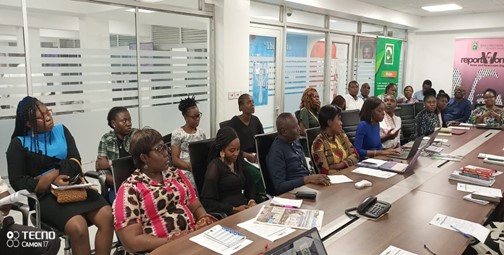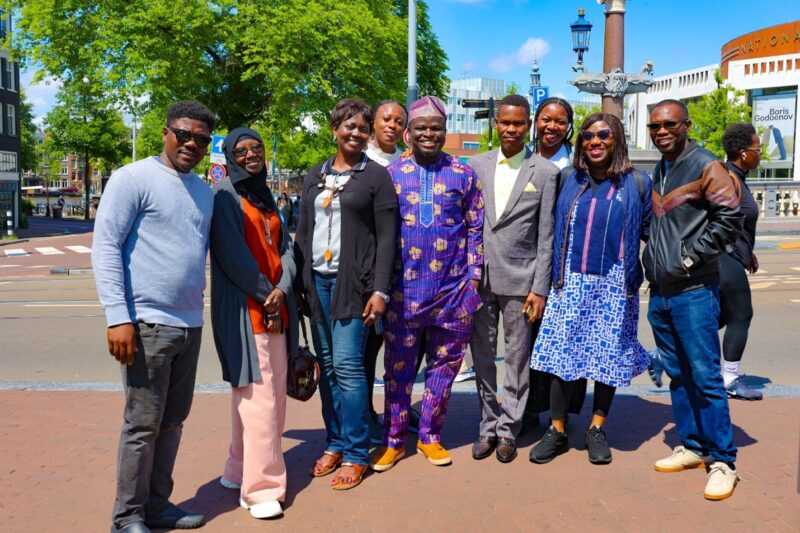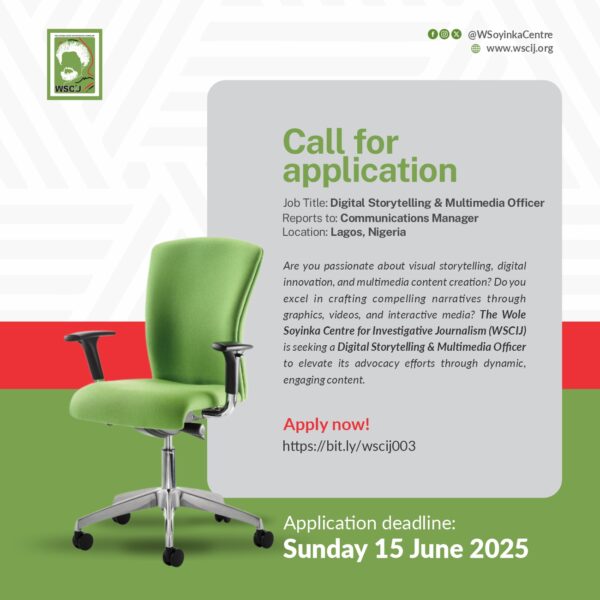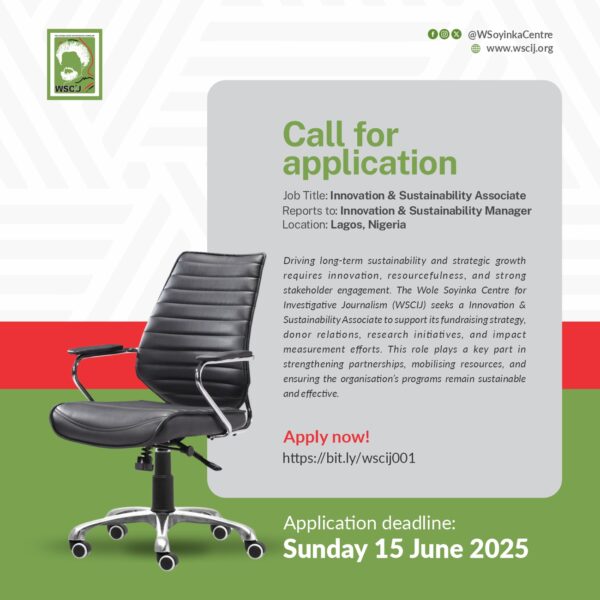The Wole Soyinka Centre for Investigative Journalism (WSCIJ) and its faculty visited The Guardian Newspaper Headquarters in Lagos, on Monday, 12 August 2024, for the former’s Report Women! News and Newsrooms House-to-House engagement on leadership status of women. The WSCIJ challenged the management and staff of the newspaper to prioritise parity between women and men in the leadership of its newsroom and news.
The event which was to build the capacity of news media organisations, share results of the report of the WSCIJ – ‘Who leads the newsrooms and news? – and engagement media owners and managers, was opened by Lois Ogunniyi, head of video operations at The Guardian, who moderated the session. Kabir Alabi, editor, The Guardian Weekend titles, in his welcome remark noted the newspaper’s longstanding relationship with the WSCIJ and the importance of its work in the news media.
One of the WSCIJ resource persons for the engagement, Abigail Ogwezzy-Ndisika, director, Institute of Continuing Education, University of Lagos, emphasised that women’s perspectives are essential for comprehensive news coverage, and it aligns news media organisations with the National Gender Policy and other international frameworks that advocate for gender representation across sectors. She noted that organisations with gender-diverse leadership tend to enjoy higher employee satisfaction, better communication, and lower turnover rates because they create a more positive and inclusive workplace culture.
Motunrayo Alaka, executive director/CEO, WSCIJ, shared findings from the centre’s report, ‘Who leads the newsrooms and news?’, which was publicly presented on February 15 2024. According to her, the report revealed that one in four persons in the leadership of the newsrooms and news are women. She noted the significant disparities in media leadership, with only 26.9% of management positions and 24.2% board roles occupied by women. Men also lead as anchors, authors, story focus and expert sources across genres of the news media with print ranking poorly in many respects. Alaka called on The Guardian to take deliberate steps to feature more women in leadership roles and news content. She affirmed the ethical, editorial, and economic benefits of doing so.
Stella Din-Jacob, director of news & editor-in-chief, TVC Communications, acknowledged the progress made towards gender equality globally and locally but noted that more work was needed. She shared her personal experience as a leader in the newsroom, the challenges of her role as a mentor and her organisation’s commitment to supporting the career growth of women in its newsroom to ensure gender balance in leadership roles. Din-Jacob emphasised the importance of nurturing female reporters, stating that more women in leadership helps to challenge and change existing stereotypes.
On the importance of mentorship and professional development to overcome the invisible ‘glass ceiling’ that many women face in the news media industry, Lekan Otufodunrin, managing director, Media Career Development Network, encouraged female journalists to pursue leadership roles despite the challenges. “The glass ceiling is real, although invisible. Mentorship and professional development are crucial for female reporters to break through,” he said. He also shared a few personal experiences on mentees that have become leaders of the newsroom.
During the interactive session, participants engaged in a robust discussion on the challenges of achieving parity between men and women in newsroom leadership and resource persons offered solutions which included creating support systems that help women thrive, empathetic feedback mechanisms, inclusive policies and intentional decisions to include women as leaders of the newsrooms and news.
In his response on behalf of The Guardian, Wole Oyebade, deputy editor (Daily), reaffirmed the newspaper’s commitment to gender parity. He noted that recent recruitment efforts brought many women into the organisation. He highlighted that The Guardian’s Business desk, for instance, had many female correspondents, and said that demonstrated the organisation’s commitment to competence-focused recruitment. Chidirim Ndeche, editor, Guardian Life, thanked WSCIJ and noted that women in leadership continue to need to prove themselves but she will support and mentor female reporters on her desk to become better leaders.
Samson Ademola, programme officer, WSCIJ, appreciated The Guardian for receiving the team and for its commitment to the inclusion of women in the leadership of the newsroom and news. He urged the Guardian team to translate learnings from the engagement into practice across their various desks.
Apart from the WSCIJ team and its resource persons, the engagement was attended by 41 members of the management and staff of The Guardian. They included Greg Nwakunor, deputy editor, Weekend; Eno Bassey, weekend production Editor; Okoli Ifunnaya, TV producer; Ijeoma Thomas-Odia, editor, Guardian Woman; Gbenga Akinfenwa, assistant features editor, Weekend; Akinlolu Olumuyiwa, deputy editor, production; and Omiko Awa, production sub-editor, Weekend.
The House-to-House initiative was designed to take training or advocacy on media matters to media houses to engage both their management and staff members. WSCIJ has used the initiative in the past to canvas for the creation of investigative journalism desk, gender policy and practices in the newsroom under the Report Women! project, and improved reporting for the energy desk.
The meeting at The Guardian is a component of the Report Women! News and Newsroom Engagement project, which engages the management and staff of news media organisations to increase the representation of women as leaders in their coverage and newsrooms. The project is supported by the Bill and Melinda Gates Foundation. The WSCIJ will visit more media houses in the coming weeks to share and engage on findings from the ‘Who leads the newsrooms and news?’ report and the project.
Signed,
WSCIJ Team








